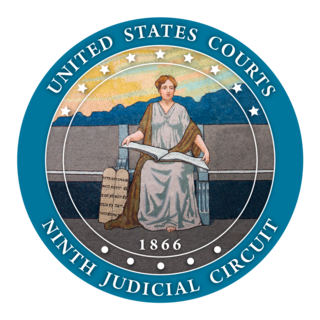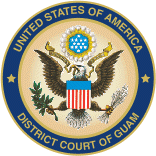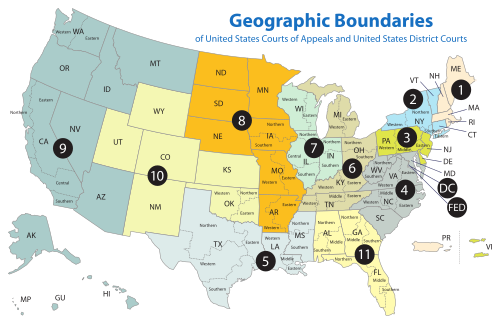
Politics of the United States Virgin Islands takes place in a framework of a presidential representative democratic dependency, whereby the Governor is the head of the territory's government, and of a multi-party system. United States Virgin Islands are an unincorporated and organized territory of the United States, administered by the Office of Insular Affairs of the United States Department of the Interior. Executive power is exercised by the local government of the Virgin Islands. The judiciary is independent of the executive and the legislature.

The United States courts of appeals are the intermediate appellate courts of the United States federal judiciary. The courts of appeals are divided into 13 "Circuits". Eleven of the circuits are numbered "First" through "Eleventh" and cover geographic areas of the United States and hear appeals from the U.S. district courts within their borders. The District of Columbia Circuit covers only Washington, DC. The Federal Circuit hears appeals from federal courts across the United States in cases involving certain specialized areas of law. The courts of appeals also hear appeals from some administrative agency decisions and rulemaking, with by far the largest share of these cases heard by the D.C. Circuit. Appeals from decisions of the courts of appeals can be taken to the U.S. Supreme Court.

The United States district courts are the trial courts of the U.S. federal judiciary. There is one district court for each federal judicial district, which each cover one U.S. state or, in some cases, a portion of a state. Each district court has at least one courthouse, and many districts have more than one. District courts' decisions are appealed to the U.S. court of appeals for the circuit in which they reside, except for certain specialized cases that are appealed to the U.S. Court of Appeals for the Federal Circuit or directly to the U.S. Supreme Court.

The federal government of the United States is the national government of the United States, a federal republic located primarily in North America, composed of 50 states, five major self-governing territories, several island possessions, and the federal district and national capital of Washington, D.C., where most of the federal government is based.

The United States Court of Appeals for the Ninth Circuit is the U.S. federal court of appeals that has appellate jurisdiction over the U.S. district courts in the following federal judicial districts:

The United States Court of Appeals for the Third Circuit is a federal court with appellate jurisdiction over the district courts for the following districts:

The Judiciary Act of 1789 was a United States federal statute enacted on September 24, 1789, during the first session of the First United States Congress. It established the federal judiciary of the United States. Article III, Section 1 of the Constitution prescribed that the "judicial power of the United States, shall be vested in one Supreme Court, and such inferior Courts" as Congress saw fit to establish. It made no provision for the composition or procedures of any of the courts, leaving this to Congress to decide.
In the United States, federal judges are judges who serve on courts established under Article Three of the U.S. Constitution. They include the chief justice and associate justices of the U.S. Supreme Court, circuit judges of the U.S. Courts of Appeals, district judges of the U.S. District Courts, and judges of the U.S. Court of International Trade. These judges are often called "Article Three judges".
The federal judiciary of the United States is one of the three branches of the federal government of the United States organized under the United States Constitution and laws of the federal government. The U.S. federal judiciary consists primarily of the U.S. Supreme Court, the U.S. Courts of Appeals, and the U.S. District Courts. It also includes a variety of other lesser federal tribunals.
The appointment of federal judges for United States federal courts is done via nomination by the President of the United States and confirmation by the United States Senate. The tables below provide the composition of all Article III courts which include the Supreme Court and the Courts of Appeals at the end of each four year presidential term, as well as the current compositions of the District Courts and the Court of International Trade, categorizing the judges by the presidential term during which they were first appointed to their seats.
The United States territorial courts are tribunals established in territories of the United States by the United States Congress, pursuant to its power under Article Four of the United States Constitution, the Territorial Clause. Most United States territorial courts are defunct because the territories under their jurisdiction have become states or been retroceded.
The Judiciary Act of 1925, also known as the Judge's Bill or Certiorari Act, was an act of the United States Congress that sought to reduce the workload of the Supreme Court of the United States.

The District Court of Guam is a United States territorial court with jurisdiction over the United States territory of Guam. It sits in the capital, Hagåtña. Appeals of the court's decisions are taken to the United States Court of Appeals for the Ninth Circuit. It is not an Article III court, and therefore its judges do not have life tenure, but are appointed to ten-year terms.
The Supreme Court of the Commonwealth of the Northern Mariana Islands, 1 CMC § 3101, is the highest court of the United States Commonwealth of the Northern Mariana Islands (CNMI), exercising civil and criminal appellate jurisdiction over commonwealth law matters. It should not be confused with the District Court for the Northern Mariana Islands, which exercises jurisdiction over federal law. The Supreme Court sits in the capital, Saipan, and consists of a Chief Justice and two Associate Justices. The CNMI has no intermediate appellate commonwealth law court, which means that the CNMI Supreme Court hears appeals directly from the trial-level Superior Court.
The Virgin Islands Superior Court is the trial court of general jurisdiction for the United States Virgin Islands. The court is composed of nine judges. They are appointed by the governor and confirmed by the Legislature. Effective January 29, 2007 the Supreme Court of the Virgin Islands assumed jurisdiction over appeals from the Superior Court.
The Government of Guam (GovGuam) is a presidential representative democratic system, whereby the president is the head of state and the governor is head of government, and of a multi-party system. Guam is an organized, unincorporated territory of the United States with policy relations between Guam and the US under the jurisdiction of the Office of Insular Affairs.
United States v. More, 7 U.S. 159 (1805), was a United States Supreme Court case in which the Court held that it had no jurisdiction to hear appeals from criminal cases in the circuit courts by writs of error. Relying on the Exceptions Clause, More held that Congress's enumerated grants of appellate jurisdiction to the Court operated as an exercise of Congress's power to eliminate all other forms of appellate jurisdiction.









